Pain Assessment in Dementia: Nurses' Knowledge and Attitude Study
VerifiedAdded on 2023/06/18
|11
|2815
|193
Report
AI Summary
This report investigates the knowledge and attitudes of nurses towards pain assessment in dementia patients at Amaka University Teaching Hospital in Anambra State, Nigeria. It addresses the challenge of pain management in dementia patients due to their cognitive dysfunction, which makes pain identification and assessment difficult. The research employs a qualitative approach, utilizing a descriptive research design and interpretivism research philosophy. Data collection involves both primary data through interviews with nurses and secondary data from published articles and research studies. The study aims to analyze the existing knowledge and attitudes, and recommend strategies for improving pain assessment practices. Ethical considerations, including informed consent, are prioritized throughout the research process. Thematic data analysis will be used to analyze the collected data and draw conclusions relevant to enhancing pain management in dementia patients through improved nursing practices. Desklib provides access to this and similar assignments.

PROPOSAL
Paraphrase This Document
Need a fresh take? Get an instant paraphrase of this document with our AI Paraphraser

1
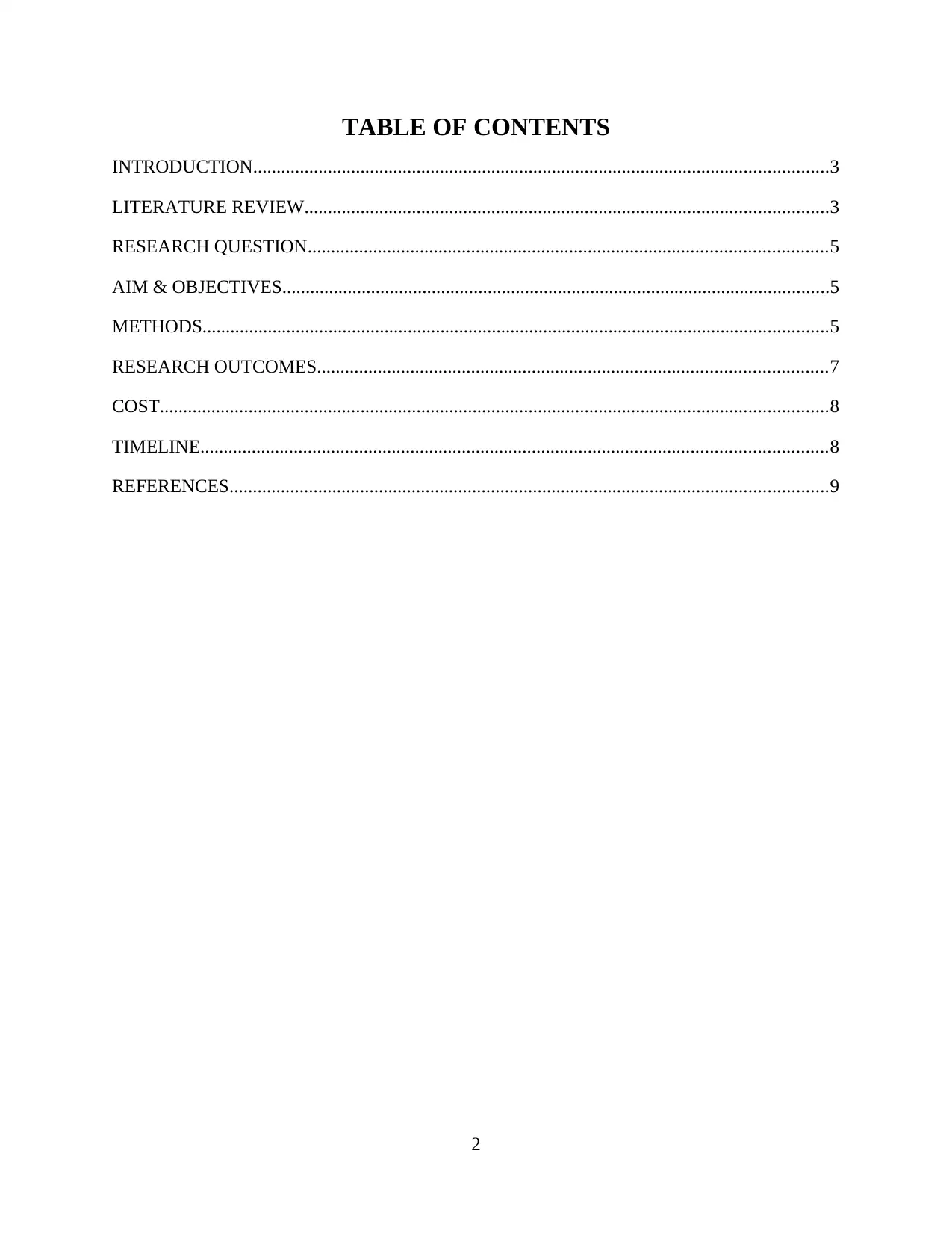
TABLE OF CONTENTS
INTRODUCTION...........................................................................................................................3
LITERATURE REVIEW................................................................................................................3
RESEARCH QUESTION...............................................................................................................5
AIM & OBJECTIVES.....................................................................................................................5
METHODS......................................................................................................................................5
RESEARCH OUTCOMES.............................................................................................................7
COST...............................................................................................................................................8
TIMELINE......................................................................................................................................8
REFERENCES................................................................................................................................9
2
INTRODUCTION...........................................................................................................................3
LITERATURE REVIEW................................................................................................................3
RESEARCH QUESTION...............................................................................................................5
AIM & OBJECTIVES.....................................................................................................................5
METHODS......................................................................................................................................5
RESEARCH OUTCOMES.............................................................................................................7
COST...............................................................................................................................................8
TIMELINE......................................................................................................................................8
REFERENCES................................................................................................................................9
2
⊘ This is a preview!⊘
Do you want full access?
Subscribe today to unlock all pages.

Trusted by 1+ million students worldwide
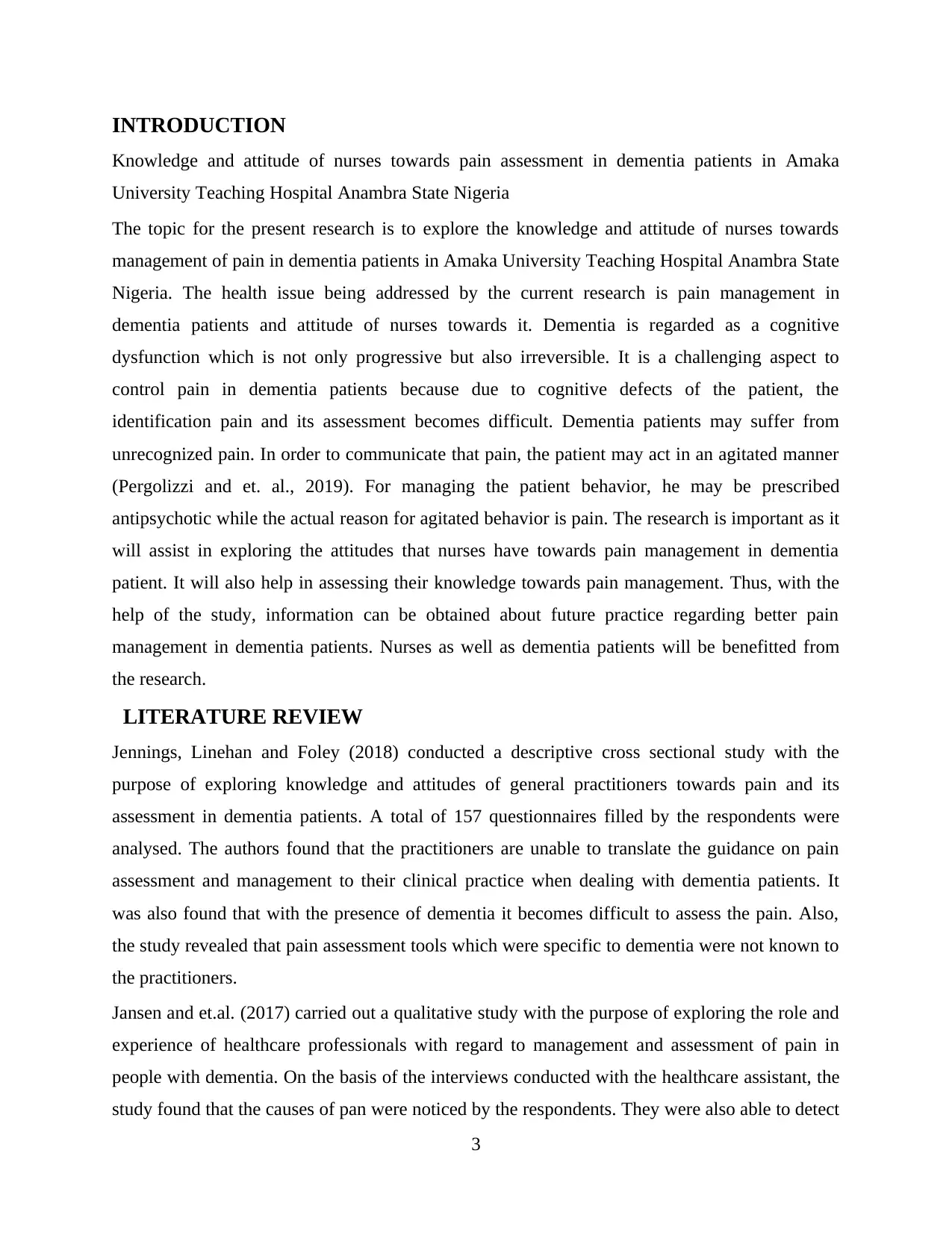
INTRODUCTION
Knowledge and attitude of nurses towards pain assessment in dementia patients in Amaka
University Teaching Hospital Anambra State Nigeria
The topic for the present research is to explore the knowledge and attitude of nurses towards
management of pain in dementia patients in Amaka University Teaching Hospital Anambra State
Nigeria. The health issue being addressed by the current research is pain management in
dementia patients and attitude of nurses towards it. Dementia is regarded as a cognitive
dysfunction which is not only progressive but also irreversible. It is a challenging aspect to
control pain in dementia patients because due to cognitive defects of the patient, the
identification pain and its assessment becomes difficult. Dementia patients may suffer from
unrecognized pain. In order to communicate that pain, the patient may act in an agitated manner
(Pergolizzi and et. al., 2019). For managing the patient behavior, he may be prescribed
antipsychotic while the actual reason for agitated behavior is pain. The research is important as it
will assist in exploring the attitudes that nurses have towards pain management in dementia
patient. It will also help in assessing their knowledge towards pain management. Thus, with the
help of the study, information can be obtained about future practice regarding better pain
management in dementia patients. Nurses as well as dementia patients will be benefitted from
the research.
LITERATURE REVIEW
Jennings, Linehan and Foley (2018) conducted a descriptive cross sectional study with the
purpose of exploring knowledge and attitudes of general practitioners towards pain and its
assessment in dementia patients. A total of 157 questionnaires filled by the respondents were
analysed. The authors found that the practitioners are unable to translate the guidance on pain
assessment and management to their clinical practice when dealing with dementia patients. It
was also found that with the presence of dementia it becomes difficult to assess the pain. Also,
the study revealed that pain assessment tools which were specific to dementia were not known to
the practitioners.
Jansen and et.al. (2017) carried out a qualitative study with the purpose of exploring the role and
experience of healthcare professionals with regard to management and assessment of pain in
people with dementia. On the basis of the interviews conducted with the healthcare assistant, the
study found that the causes of pan were noticed by the respondents. They were also able to detect
3
Knowledge and attitude of nurses towards pain assessment in dementia patients in Amaka
University Teaching Hospital Anambra State Nigeria
The topic for the present research is to explore the knowledge and attitude of nurses towards
management of pain in dementia patients in Amaka University Teaching Hospital Anambra State
Nigeria. The health issue being addressed by the current research is pain management in
dementia patients and attitude of nurses towards it. Dementia is regarded as a cognitive
dysfunction which is not only progressive but also irreversible. It is a challenging aspect to
control pain in dementia patients because due to cognitive defects of the patient, the
identification pain and its assessment becomes difficult. Dementia patients may suffer from
unrecognized pain. In order to communicate that pain, the patient may act in an agitated manner
(Pergolizzi and et. al., 2019). For managing the patient behavior, he may be prescribed
antipsychotic while the actual reason for agitated behavior is pain. The research is important as it
will assist in exploring the attitudes that nurses have towards pain management in dementia
patient. It will also help in assessing their knowledge towards pain management. Thus, with the
help of the study, information can be obtained about future practice regarding better pain
management in dementia patients. Nurses as well as dementia patients will be benefitted from
the research.
LITERATURE REVIEW
Jennings, Linehan and Foley (2018) conducted a descriptive cross sectional study with the
purpose of exploring knowledge and attitudes of general practitioners towards pain and its
assessment in dementia patients. A total of 157 questionnaires filled by the respondents were
analysed. The authors found that the practitioners are unable to translate the guidance on pain
assessment and management to their clinical practice when dealing with dementia patients. It
was also found that with the presence of dementia it becomes difficult to assess the pain. Also,
the study revealed that pain assessment tools which were specific to dementia were not known to
the practitioners.
Jansen and et.al. (2017) carried out a qualitative study with the purpose of exploring the role and
experience of healthcare professionals with regard to management and assessment of pain in
people with dementia. On the basis of the interviews conducted with the healthcare assistant, the
study found that the causes of pan were noticed by the respondents. They were also able to detect
3
Paraphrase This Document
Need a fresh take? Get an instant paraphrase of this document with our AI Paraphraser
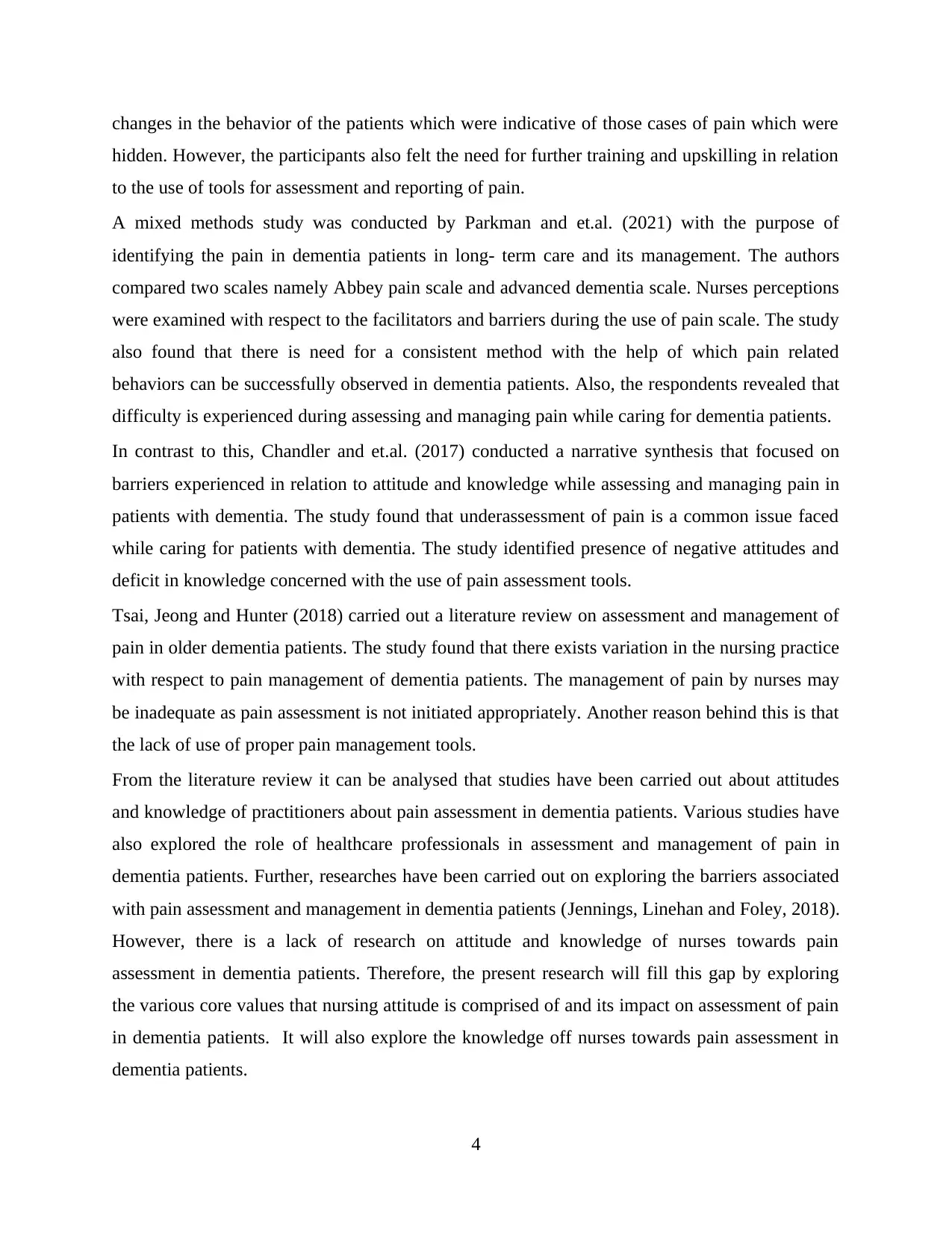
changes in the behavior of the patients which were indicative of those cases of pain which were
hidden. However, the participants also felt the need for further training and upskilling in relation
to the use of tools for assessment and reporting of pain.
A mixed methods study was conducted by Parkman and et.al. (2021) with the purpose of
identifying the pain in dementia patients in long- term care and its management. The authors
compared two scales namely Abbey pain scale and advanced dementia scale. Nurses perceptions
were examined with respect to the facilitators and barriers during the use of pain scale. The study
also found that there is need for a consistent method with the help of which pain related
behaviors can be successfully observed in dementia patients. Also, the respondents revealed that
difficulty is experienced during assessing and managing pain while caring for dementia patients.
In contrast to this, Chandler and et.al. (2017) conducted a narrative synthesis that focused on
barriers experienced in relation to attitude and knowledge while assessing and managing pain in
patients with dementia. The study found that underassessment of pain is a common issue faced
while caring for patients with dementia. The study identified presence of negative attitudes and
deficit in knowledge concerned with the use of pain assessment tools.
Tsai, Jeong and Hunter (2018) carried out a literature review on assessment and management of
pain in older dementia patients. The study found that there exists variation in the nursing practice
with respect to pain management of dementia patients. The management of pain by nurses may
be inadequate as pain assessment is not initiated appropriately. Another reason behind this is that
the lack of use of proper pain management tools.
From the literature review it can be analysed that studies have been carried out about attitudes
and knowledge of practitioners about pain assessment in dementia patients. Various studies have
also explored the role of healthcare professionals in assessment and management of pain in
dementia patients. Further, researches have been carried out on exploring the barriers associated
with pain assessment and management in dementia patients (Jennings, Linehan and Foley, 2018).
However, there is a lack of research on attitude and knowledge of nurses towards pain
assessment in dementia patients. Therefore, the present research will fill this gap by exploring
the various core values that nursing attitude is comprised of and its impact on assessment of pain
in dementia patients. It will also explore the knowledge off nurses towards pain assessment in
dementia patients.
4
hidden. However, the participants also felt the need for further training and upskilling in relation
to the use of tools for assessment and reporting of pain.
A mixed methods study was conducted by Parkman and et.al. (2021) with the purpose of
identifying the pain in dementia patients in long- term care and its management. The authors
compared two scales namely Abbey pain scale and advanced dementia scale. Nurses perceptions
were examined with respect to the facilitators and barriers during the use of pain scale. The study
also found that there is need for a consistent method with the help of which pain related
behaviors can be successfully observed in dementia patients. Also, the respondents revealed that
difficulty is experienced during assessing and managing pain while caring for dementia patients.
In contrast to this, Chandler and et.al. (2017) conducted a narrative synthesis that focused on
barriers experienced in relation to attitude and knowledge while assessing and managing pain in
patients with dementia. The study found that underassessment of pain is a common issue faced
while caring for patients with dementia. The study identified presence of negative attitudes and
deficit in knowledge concerned with the use of pain assessment tools.
Tsai, Jeong and Hunter (2018) carried out a literature review on assessment and management of
pain in older dementia patients. The study found that there exists variation in the nursing practice
with respect to pain management of dementia patients. The management of pain by nurses may
be inadequate as pain assessment is not initiated appropriately. Another reason behind this is that
the lack of use of proper pain management tools.
From the literature review it can be analysed that studies have been carried out about attitudes
and knowledge of practitioners about pain assessment in dementia patients. Various studies have
also explored the role of healthcare professionals in assessment and management of pain in
dementia patients. Further, researches have been carried out on exploring the barriers associated
with pain assessment and management in dementia patients (Jennings, Linehan and Foley, 2018).
However, there is a lack of research on attitude and knowledge of nurses towards pain
assessment in dementia patients. Therefore, the present research will fill this gap by exploring
the various core values that nursing attitude is comprised of and its impact on assessment of pain
in dementia patients. It will also explore the knowledge off nurses towards pain assessment in
dementia patients.
4
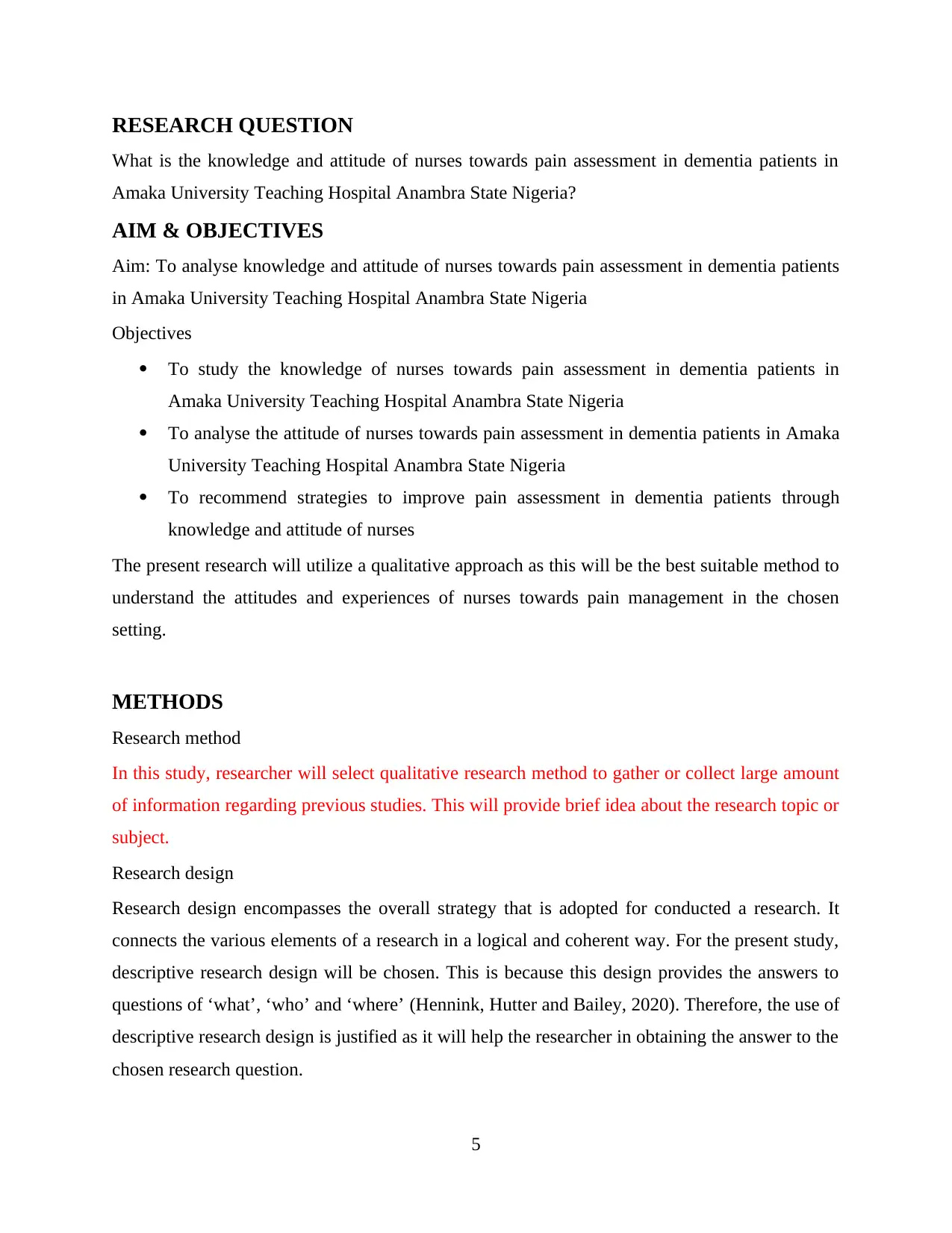
RESEARCH QUESTION
What is the knowledge and attitude of nurses towards pain assessment in dementia patients in
Amaka University Teaching Hospital Anambra State Nigeria?
AIM & OBJECTIVES
Aim: To analyse knowledge and attitude of nurses towards pain assessment in dementia patients
in Amaka University Teaching Hospital Anambra State Nigeria
Objectives
To study the knowledge of nurses towards pain assessment in dementia patients in
Amaka University Teaching Hospital Anambra State Nigeria
To analyse the attitude of nurses towards pain assessment in dementia patients in Amaka
University Teaching Hospital Anambra State Nigeria
To recommend strategies to improve pain assessment in dementia patients through
knowledge and attitude of nurses
The present research will utilize a qualitative approach as this will be the best suitable method to
understand the attitudes and experiences of nurses towards pain management in the chosen
setting.
METHODS
Research method
In this study, researcher will select qualitative research method to gather or collect large amount
of information regarding previous studies. This will provide brief idea about the research topic or
subject.
Research design
Research design encompasses the overall strategy that is adopted for conducted a research. It
connects the various elements of a research in a logical and coherent way. For the present study,
descriptive research design will be chosen. This is because this design provides the answers to
questions of ‘what’, ‘who’ and ‘where’ (Hennink, Hutter and Bailey, 2020). Therefore, the use of
descriptive research design is justified as it will help the researcher in obtaining the answer to the
chosen research question.
5
What is the knowledge and attitude of nurses towards pain assessment in dementia patients in
Amaka University Teaching Hospital Anambra State Nigeria?
AIM & OBJECTIVES
Aim: To analyse knowledge and attitude of nurses towards pain assessment in dementia patients
in Amaka University Teaching Hospital Anambra State Nigeria
Objectives
To study the knowledge of nurses towards pain assessment in dementia patients in
Amaka University Teaching Hospital Anambra State Nigeria
To analyse the attitude of nurses towards pain assessment in dementia patients in Amaka
University Teaching Hospital Anambra State Nigeria
To recommend strategies to improve pain assessment in dementia patients through
knowledge and attitude of nurses
The present research will utilize a qualitative approach as this will be the best suitable method to
understand the attitudes and experiences of nurses towards pain management in the chosen
setting.
METHODS
Research method
In this study, researcher will select qualitative research method to gather or collect large amount
of information regarding previous studies. This will provide brief idea about the research topic or
subject.
Research design
Research design encompasses the overall strategy that is adopted for conducted a research. It
connects the various elements of a research in a logical and coherent way. For the present study,
descriptive research design will be chosen. This is because this design provides the answers to
questions of ‘what’, ‘who’ and ‘where’ (Hennink, Hutter and Bailey, 2020). Therefore, the use of
descriptive research design is justified as it will help the researcher in obtaining the answer to the
chosen research question.
5
⊘ This is a preview!⊘
Do you want full access?
Subscribe today to unlock all pages.

Trusted by 1+ million students worldwide
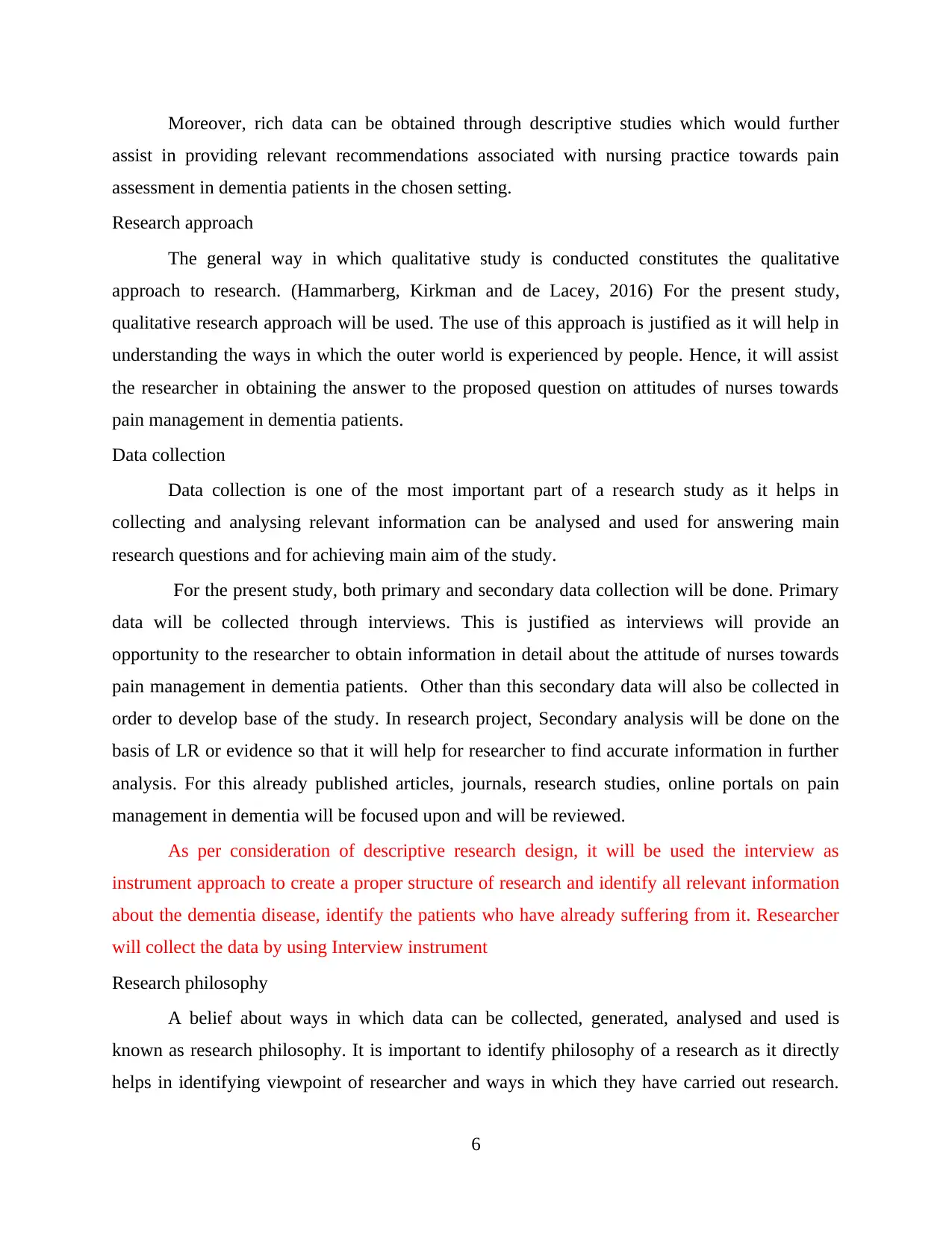
Moreover, rich data can be obtained through descriptive studies which would further
assist in providing relevant recommendations associated with nursing practice towards pain
assessment in dementia patients in the chosen setting.
Research approach
The general way in which qualitative study is conducted constitutes the qualitative
approach to research. (Hammarberg, Kirkman and de Lacey, 2016) For the present study,
qualitative research approach will be used. The use of this approach is justified as it will help in
understanding the ways in which the outer world is experienced by people. Hence, it will assist
the researcher in obtaining the answer to the proposed question on attitudes of nurses towards
pain management in dementia patients.
Data collection
Data collection is one of the most important part of a research study as it helps in
collecting and analysing relevant information can be analysed and used for answering main
research questions and for achieving main aim of the study.
For the present study, both primary and secondary data collection will be done. Primary
data will be collected through interviews. This is justified as interviews will provide an
opportunity to the researcher to obtain information in detail about the attitude of nurses towards
pain management in dementia patients. Other than this secondary data will also be collected in
order to develop base of the study. In research project, Secondary analysis will be done on the
basis of LR or evidence so that it will help for researcher to find accurate information in further
analysis. For this already published articles, journals, research studies, online portals on pain
management in dementia will be focused upon and will be reviewed.
As per consideration of descriptive research design, it will be used the interview as
instrument approach to create a proper structure of research and identify all relevant information
about the dementia disease, identify the patients who have already suffering from it. Researcher
will collect the data by using Interview instrument
Research philosophy
A belief about ways in which data can be collected, generated, analysed and used is
known as research philosophy. It is important to identify philosophy of a research as it directly
helps in identifying viewpoint of researcher and ways in which they have carried out research.
6
assist in providing relevant recommendations associated with nursing practice towards pain
assessment in dementia patients in the chosen setting.
Research approach
The general way in which qualitative study is conducted constitutes the qualitative
approach to research. (Hammarberg, Kirkman and de Lacey, 2016) For the present study,
qualitative research approach will be used. The use of this approach is justified as it will help in
understanding the ways in which the outer world is experienced by people. Hence, it will assist
the researcher in obtaining the answer to the proposed question on attitudes of nurses towards
pain management in dementia patients.
Data collection
Data collection is one of the most important part of a research study as it helps in
collecting and analysing relevant information can be analysed and used for answering main
research questions and for achieving main aim of the study.
For the present study, both primary and secondary data collection will be done. Primary
data will be collected through interviews. This is justified as interviews will provide an
opportunity to the researcher to obtain information in detail about the attitude of nurses towards
pain management in dementia patients. Other than this secondary data will also be collected in
order to develop base of the study. In research project, Secondary analysis will be done on the
basis of LR or evidence so that it will help for researcher to find accurate information in further
analysis. For this already published articles, journals, research studies, online portals on pain
management in dementia will be focused upon and will be reviewed.
As per consideration of descriptive research design, it will be used the interview as
instrument approach to create a proper structure of research and identify all relevant information
about the dementia disease, identify the patients who have already suffering from it. Researcher
will collect the data by using Interview instrument
Research philosophy
A belief about ways in which data can be collected, generated, analysed and used is
known as research philosophy. It is important to identify philosophy of a research as it directly
helps in identifying viewpoint of researcher and ways in which they have carried out research.
6
Paraphrase This Document
Need a fresh take? Get an instant paraphrase of this document with our AI Paraphraser
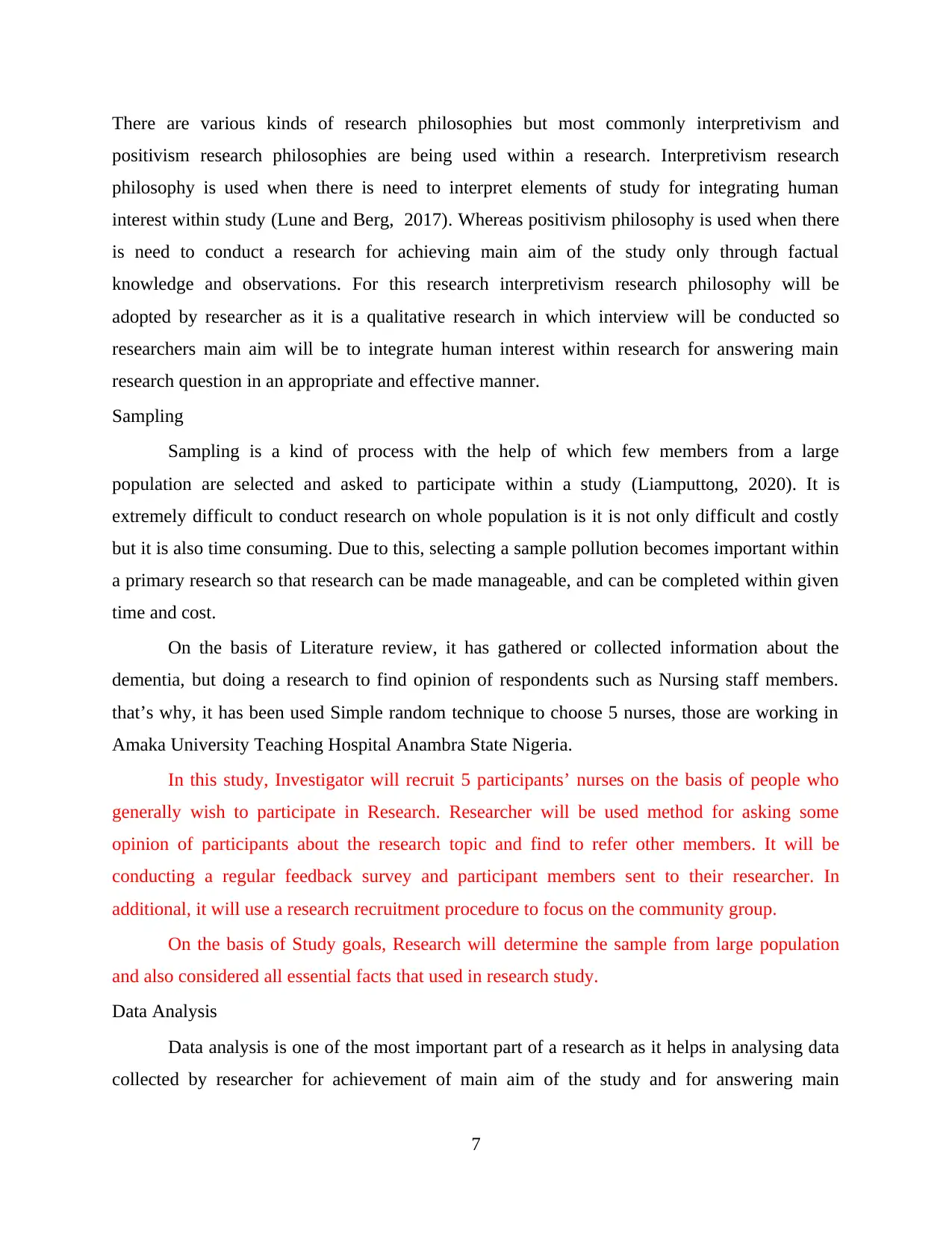
There are various kinds of research philosophies but most commonly interpretivism and
positivism research philosophies are being used within a research. Interpretivism research
philosophy is used when there is need to interpret elements of study for integrating human
interest within study (Lune and Berg, 2017). Whereas positivism philosophy is used when there
is need to conduct a research for achieving main aim of the study only through factual
knowledge and observations. For this research interpretivism research philosophy will be
adopted by researcher as it is a qualitative research in which interview will be conducted so
researchers main aim will be to integrate human interest within research for answering main
research question in an appropriate and effective manner.
Sampling
Sampling is a kind of process with the help of which few members from a large
population are selected and asked to participate within a study (Liamputtong, 2020). It is
extremely difficult to conduct research on whole population is it is not only difficult and costly
but it is also time consuming. Due to this, selecting a sample pollution becomes important within
a primary research so that research can be made manageable, and can be completed within given
time and cost.
On the basis of Literature review, it has gathered or collected information about the
dementia, but doing a research to find opinion of respondents such as Nursing staff members.
that’s why, it has been used Simple random technique to choose 5 nurses, those are working in
Amaka University Teaching Hospital Anambra State Nigeria.
In this study, Investigator will recruit 5 participants’ nurses on the basis of people who
generally wish to participate in Research. Researcher will be used method for asking some
opinion of participants about the research topic and find to refer other members. It will be
conducting a regular feedback survey and participant members sent to their researcher. In
additional, it will use a research recruitment procedure to focus on the community group.
On the basis of Study goals, Research will determine the sample from large population
and also considered all essential facts that used in research study.
Data Analysis
Data analysis is one of the most important part of a research as it helps in analysing data
collected by researcher for achievement of main aim of the study and for answering main
7
positivism research philosophies are being used within a research. Interpretivism research
philosophy is used when there is need to interpret elements of study for integrating human
interest within study (Lune and Berg, 2017). Whereas positivism philosophy is used when there
is need to conduct a research for achieving main aim of the study only through factual
knowledge and observations. For this research interpretivism research philosophy will be
adopted by researcher as it is a qualitative research in which interview will be conducted so
researchers main aim will be to integrate human interest within research for answering main
research question in an appropriate and effective manner.
Sampling
Sampling is a kind of process with the help of which few members from a large
population are selected and asked to participate within a study (Liamputtong, 2020). It is
extremely difficult to conduct research on whole population is it is not only difficult and costly
but it is also time consuming. Due to this, selecting a sample pollution becomes important within
a primary research so that research can be made manageable, and can be completed within given
time and cost.
On the basis of Literature review, it has gathered or collected information about the
dementia, but doing a research to find opinion of respondents such as Nursing staff members.
that’s why, it has been used Simple random technique to choose 5 nurses, those are working in
Amaka University Teaching Hospital Anambra State Nigeria.
In this study, Investigator will recruit 5 participants’ nurses on the basis of people who
generally wish to participate in Research. Researcher will be used method for asking some
opinion of participants about the research topic and find to refer other members. It will be
conducting a regular feedback survey and participant members sent to their researcher. In
additional, it will use a research recruitment procedure to focus on the community group.
On the basis of Study goals, Research will determine the sample from large population
and also considered all essential facts that used in research study.
Data Analysis
Data analysis is one of the most important part of a research as it helps in analysing data
collected by researcher for achievement of main aim of the study and for answering main
7
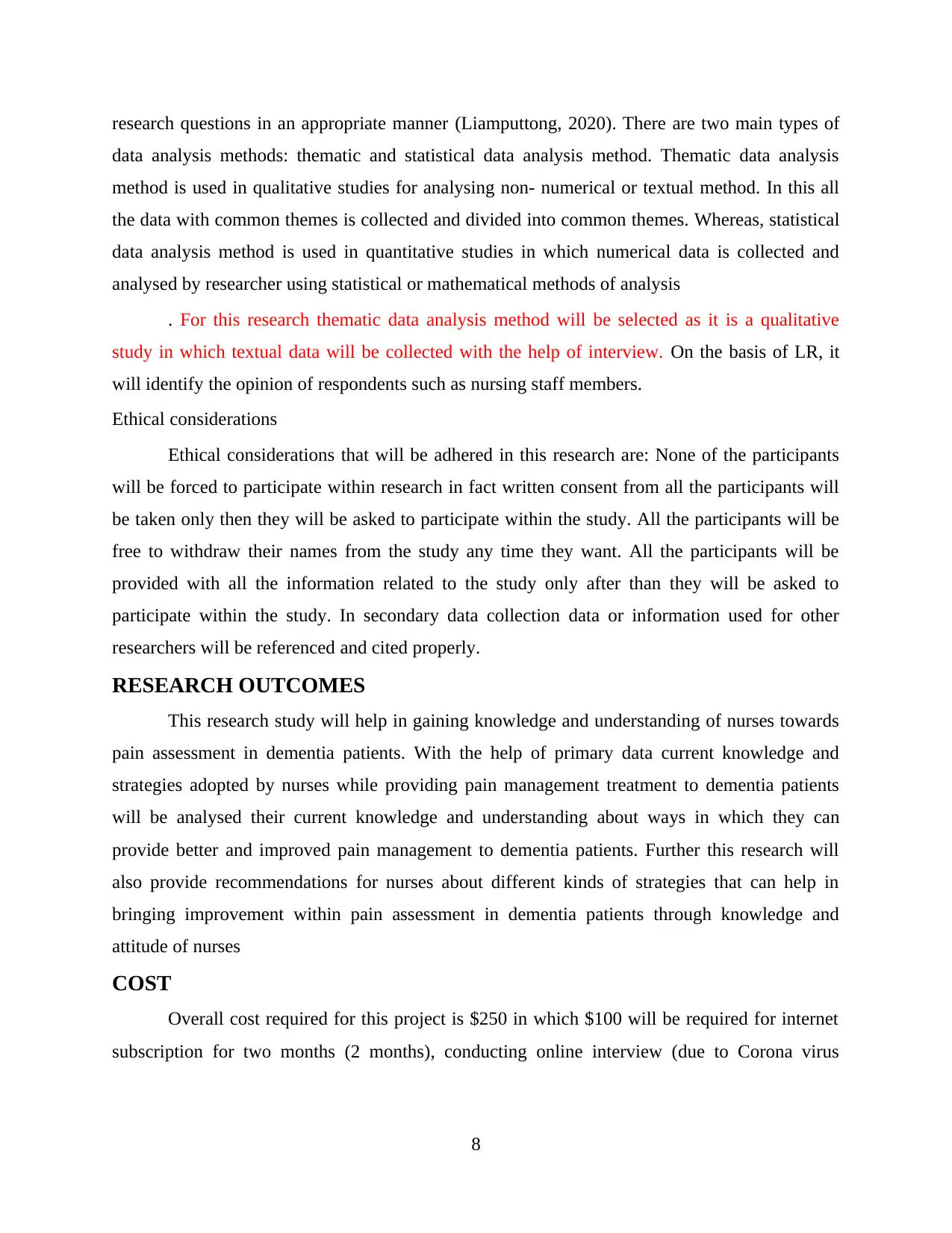
research questions in an appropriate manner (Liamputtong, 2020). There are two main types of
data analysis methods: thematic and statistical data analysis method. Thematic data analysis
method is used in qualitative studies for analysing non- numerical or textual method. In this all
the data with common themes is collected and divided into common themes. Whereas, statistical
data analysis method is used in quantitative studies in which numerical data is collected and
analysed by researcher using statistical or mathematical methods of analysis
. For this research thematic data analysis method will be selected as it is a qualitative
study in which textual data will be collected with the help of interview. On the basis of LR, it
will identify the opinion of respondents such as nursing staff members.
Ethical considerations
Ethical considerations that will be adhered in this research are: None of the participants
will be forced to participate within research in fact written consent from all the participants will
be taken only then they will be asked to participate within the study. All the participants will be
free to withdraw their names from the study any time they want. All the participants will be
provided with all the information related to the study only after than they will be asked to
participate within the study. In secondary data collection data or information used for other
researchers will be referenced and cited properly.
RESEARCH OUTCOMES
This research study will help in gaining knowledge and understanding of nurses towards
pain assessment in dementia patients. With the help of primary data current knowledge and
strategies adopted by nurses while providing pain management treatment to dementia patients
will be analysed their current knowledge and understanding about ways in which they can
provide better and improved pain management to dementia patients. Further this research will
also provide recommendations for nurses about different kinds of strategies that can help in
bringing improvement within pain assessment in dementia patients through knowledge and
attitude of nurses
COST
Overall cost required for this project is $250 in which $100 will be required for internet
subscription for two months (2 months), conducting online interview (due to Corona virus
8
data analysis methods: thematic and statistical data analysis method. Thematic data analysis
method is used in qualitative studies for analysing non- numerical or textual method. In this all
the data with common themes is collected and divided into common themes. Whereas, statistical
data analysis method is used in quantitative studies in which numerical data is collected and
analysed by researcher using statistical or mathematical methods of analysis
. For this research thematic data analysis method will be selected as it is a qualitative
study in which textual data will be collected with the help of interview. On the basis of LR, it
will identify the opinion of respondents such as nursing staff members.
Ethical considerations
Ethical considerations that will be adhered in this research are: None of the participants
will be forced to participate within research in fact written consent from all the participants will
be taken only then they will be asked to participate within the study. All the participants will be
free to withdraw their names from the study any time they want. All the participants will be
provided with all the information related to the study only after than they will be asked to
participate within the study. In secondary data collection data or information used for other
researchers will be referenced and cited properly.
RESEARCH OUTCOMES
This research study will help in gaining knowledge and understanding of nurses towards
pain assessment in dementia patients. With the help of primary data current knowledge and
strategies adopted by nurses while providing pain management treatment to dementia patients
will be analysed their current knowledge and understanding about ways in which they can
provide better and improved pain management to dementia patients. Further this research will
also provide recommendations for nurses about different kinds of strategies that can help in
bringing improvement within pain assessment in dementia patients through knowledge and
attitude of nurses
COST
Overall cost required for this project is $250 in which $100 will be required for internet
subscription for two months (2 months), conducting online interview (due to Corona virus
8
⊘ This is a preview!⊘
Do you want full access?
Subscribe today to unlock all pages.

Trusted by 1+ million students worldwide
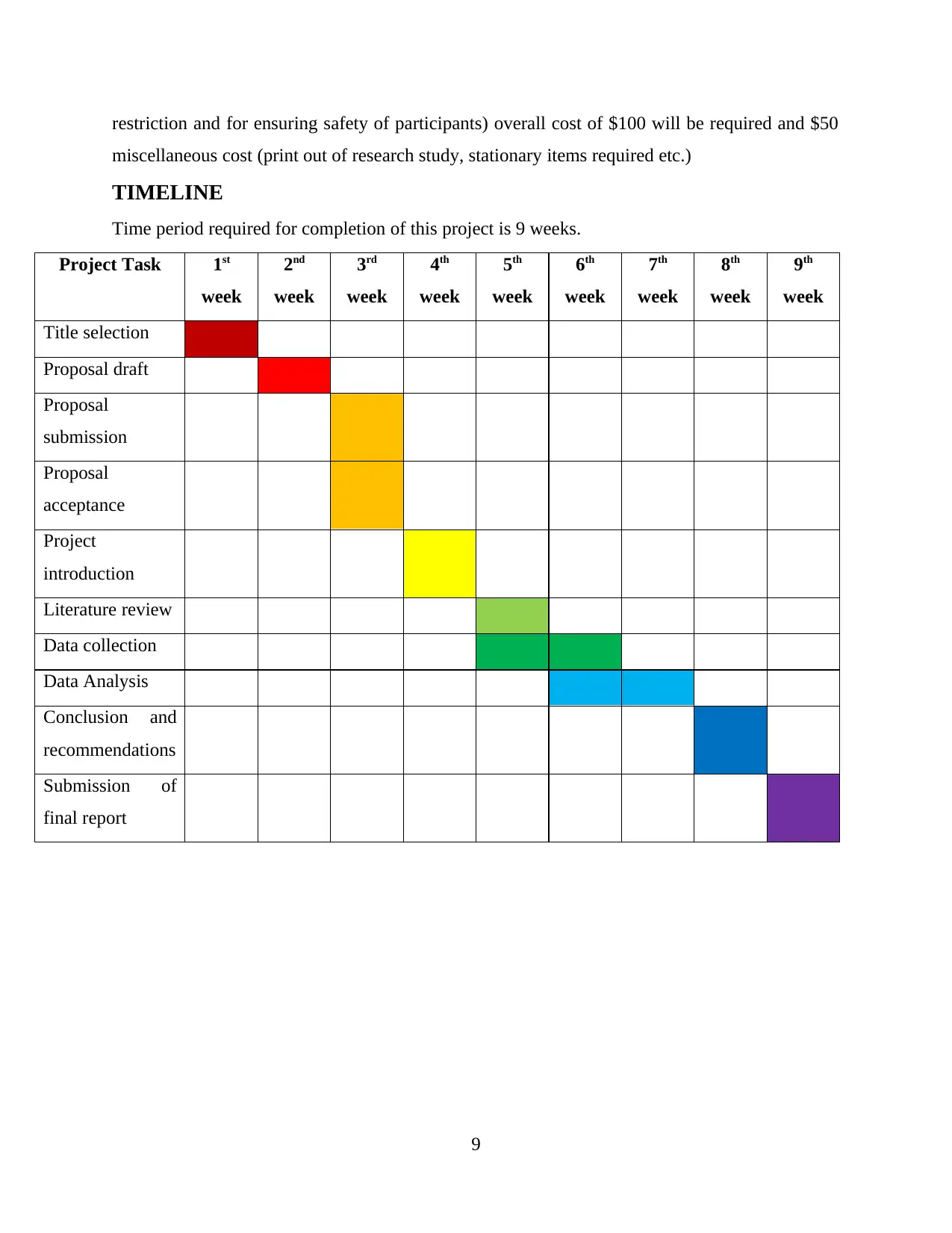
restriction and for ensuring safety of participants) overall cost of $100 will be required and $50
miscellaneous cost (print out of research study, stationary items required etc.)
TIMELINE
Time period required for completion of this project is 9 weeks.
Project Task 1st
week
2nd
week
3rd
week
4th
week
5th
week
6th
week
7th
week
8th
week
9th
week
Title selection
Proposal draft
Proposal
submission
Proposal
acceptance
Project
introduction
Literature review
Data collection
Data Analysis
Conclusion and
recommendations
Submission of
final report
9
miscellaneous cost (print out of research study, stationary items required etc.)
TIMELINE
Time period required for completion of this project is 9 weeks.
Project Task 1st
week
2nd
week
3rd
week
4th
week
5th
week
6th
week
7th
week
8th
week
9th
week
Title selection
Proposal draft
Proposal
submission
Proposal
acceptance
Project
introduction
Literature review
Data collection
Data Analysis
Conclusion and
recommendations
Submission of
final report
9
Paraphrase This Document
Need a fresh take? Get an instant paraphrase of this document with our AI Paraphraser
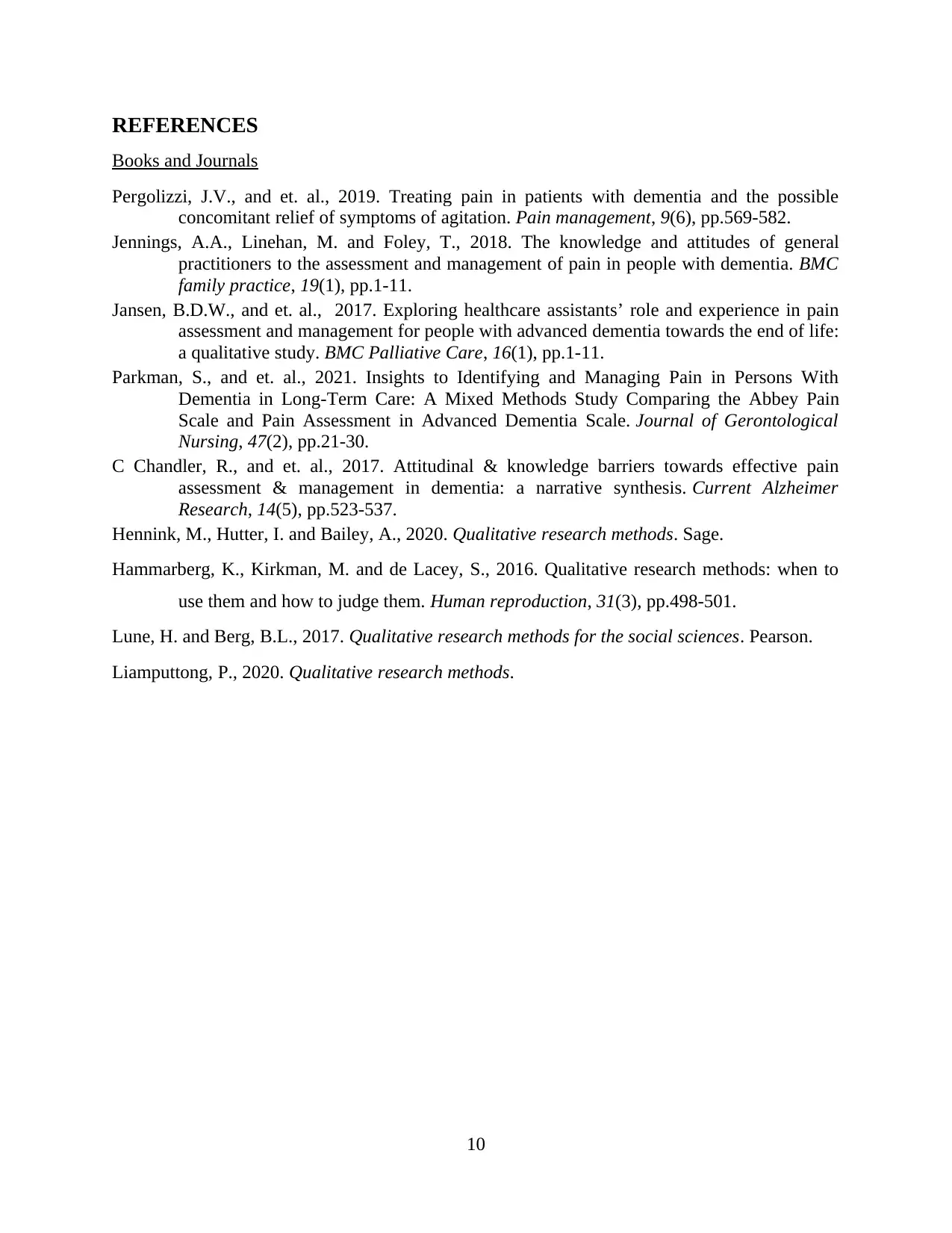
REFERENCES
Books and Journals
Pergolizzi, J.V., and et. al., 2019. Treating pain in patients with dementia and the possible
concomitant relief of symptoms of agitation. Pain management, 9(6), pp.569-582.
Jennings, A.A., Linehan, M. and Foley, T., 2018. The knowledge and attitudes of general
practitioners to the assessment and management of pain in people with dementia. BMC
family practice, 19(1), pp.1-11.
Jansen, B.D.W., and et. al., 2017. Exploring healthcare assistants’ role and experience in pain
assessment and management for people with advanced dementia towards the end of life:
a qualitative study. BMC Palliative Care, 16(1), pp.1-11.
Parkman, S., and et. al., 2021. Insights to Identifying and Managing Pain in Persons With
Dementia in Long-Term Care: A Mixed Methods Study Comparing the Abbey Pain
Scale and Pain Assessment in Advanced Dementia Scale. Journal of Gerontological
Nursing, 47(2), pp.21-30.
C Chandler, R., and et. al., 2017. Attitudinal & knowledge barriers towards effective pain
assessment & management in dementia: a narrative synthesis. Current Alzheimer
Research, 14(5), pp.523-537.
Hennink, M., Hutter, I. and Bailey, A., 2020. Qualitative research methods. Sage.
Hammarberg, K., Kirkman, M. and de Lacey, S., 2016. Qualitative research methods: when to
use them and how to judge them. Human reproduction, 31(3), pp.498-501.
Lune, H. and Berg, B.L., 2017. Qualitative research methods for the social sciences. Pearson.
Liamputtong, P., 2020. Qualitative research methods.
10
Books and Journals
Pergolizzi, J.V., and et. al., 2019. Treating pain in patients with dementia and the possible
concomitant relief of symptoms of agitation. Pain management, 9(6), pp.569-582.
Jennings, A.A., Linehan, M. and Foley, T., 2018. The knowledge and attitudes of general
practitioners to the assessment and management of pain in people with dementia. BMC
family practice, 19(1), pp.1-11.
Jansen, B.D.W., and et. al., 2017. Exploring healthcare assistants’ role and experience in pain
assessment and management for people with advanced dementia towards the end of life:
a qualitative study. BMC Palliative Care, 16(1), pp.1-11.
Parkman, S., and et. al., 2021. Insights to Identifying and Managing Pain in Persons With
Dementia in Long-Term Care: A Mixed Methods Study Comparing the Abbey Pain
Scale and Pain Assessment in Advanced Dementia Scale. Journal of Gerontological
Nursing, 47(2), pp.21-30.
C Chandler, R., and et. al., 2017. Attitudinal & knowledge barriers towards effective pain
assessment & management in dementia: a narrative synthesis. Current Alzheimer
Research, 14(5), pp.523-537.
Hennink, M., Hutter, I. and Bailey, A., 2020. Qualitative research methods. Sage.
Hammarberg, K., Kirkman, M. and de Lacey, S., 2016. Qualitative research methods: when to
use them and how to judge them. Human reproduction, 31(3), pp.498-501.
Lune, H. and Berg, B.L., 2017. Qualitative research methods for the social sciences. Pearson.
Liamputtong, P., 2020. Qualitative research methods.
10
1 out of 11
Related Documents
Your All-in-One AI-Powered Toolkit for Academic Success.
+13062052269
info@desklib.com
Available 24*7 on WhatsApp / Email
![[object Object]](/_next/static/media/star-bottom.7253800d.svg)
Unlock your academic potential
Copyright © 2020–2025 A2Z Services. All Rights Reserved. Developed and managed by ZUCOL.





